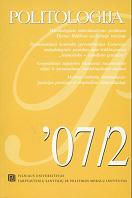Parlamentinės kontrolės įgyvendinimas Lietuvoje: metodologinės pastabos apie trūkinėjančią „šeimininko – samdinio grandinę“
Implementation of Parliamentary Control in Lithuania: Methodological Notes about the Rupturing “Principal-Agent Chain”
Author(s): Alvidas LukošaitisSubject(s): Politics / Political Sciences
Published by: Vilniaus universiteto leidykla & VU Tarptautinių santykių ir politikos mokslų institutas
Summary/Abstract: Article analyses processes of parliamentary control in Lithuania. The research is based on the “Agent – Principal” theory approach, which demonstrates a simplified perception of parliamentary control in Lithuania. That induces the application of a limited, i.e. information-based, means of parliamentary control in political practice. Parliamentary control in Lithuania is perceived as an act of subordinate coercion by governmental institutions, rather than continuous communication and cooperation. That causes the fragmentation of parliamentary control. Due to semi-presidential system’s delegation of authority and accountability, parliamentary control is rather complicated in Lithuania. Efficient parliamentary control is impossible without political parties, which should be prepared to professionally govern or compete. Lithuanian political parties seem unprepared for these tasks. Research suggests that simplified perception of parliamentary control prevailing in Lithuania complicates its implementation in practice, though institutional preconditions for the implementation of efficient parliamentary control are present.
Journal: Politologija
- Issue Year: 2007
- Issue No: 2(46)
- Page Range: 38-72
- Page Count: 35
- Language: Lithuanian

